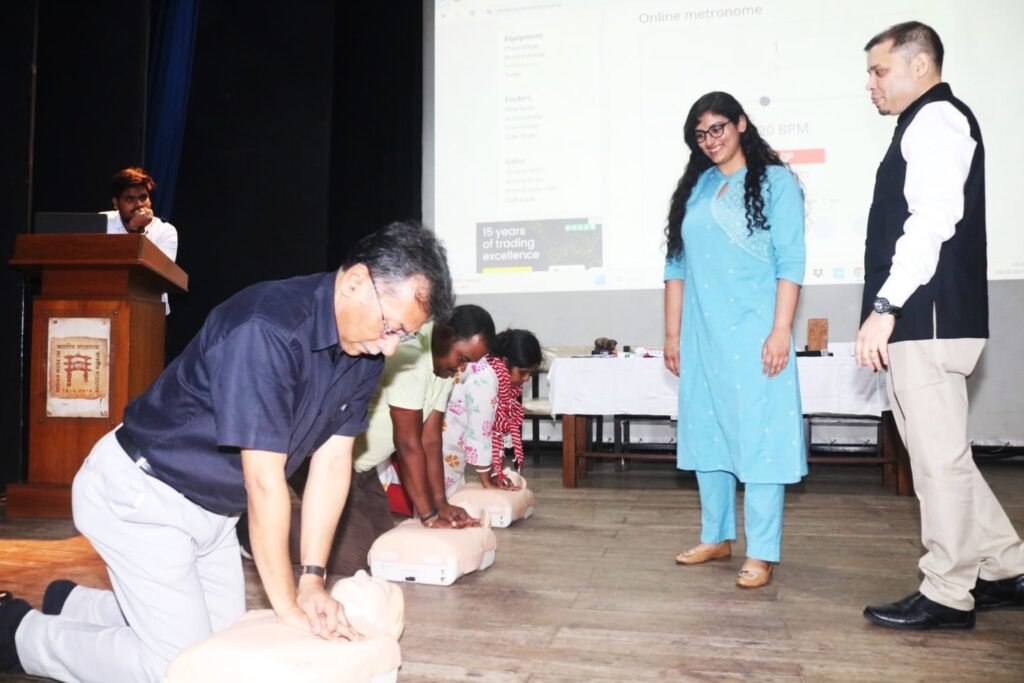
Mumbai / Kolkata, 10th May 2024: Medica Superspecialty Hospital, the leading chain of hospitals from Eastern India, is proud to announce its collaboration with the Indian Museum Kolkata for the first time, in organizing the Basic Life Support (BLS) session today, at the esteemed Indian Museum premises. In India, nearly one out of every two heart attack patients arrive at the hospital more than 400 minutes after the onset of symptoms. This delay surpasses the optimal window of 30 minutes by almost 13 times. Medical professionals emphasize that beyond 18 minutes of a cardiac arrest, the lack of medical intervention can lead to irreversible bodily harm due to insufficient blood supply. This underscores the critical role of BLS training in preserving lives. The module teaches individuals about how to administer critical life-saving techniques like Cardiopulmonary Resuscitation (CPR) to manage a medical emergency and possibly save the life of a patient. Although BLS training cannot replace a paramedical or doctor, it can prevent a person’s health from deteriorating any further. Today, there were two sessions of Basic Life Support (BLS) training. The first session ran from 11 AM to 1 PM, followed by the second session from 2 PM to 4 PM. Each session accommodated 20 participants, comprising staff and other members of the Indian Museum.
Here, The BLS session aimed to equip individuals with essential life-saving skills, in line with the standards set by the American Heart Association (AHA). Led by Dr. Indranil Das, Head of Emergency at Medica Superspecialty Hospital and an alumnus of the International Visitorship Leadership Programme (IVLP) in the USA.
While talking about the importance of BLS training, Dr. Indranil Das, shared, “Equipping employees with Basic Life Support (BLS) training not only saves lives but also fosters a culture of safety and preparedness within organizations. In the critical moments of a medical emergency, a trained individual can be the difference between life and death. By instilling BLS skills across the workforce, we mitigate workplace accidents while empowering individuals to act swiftly and effectively in any setting, be it the office or their homes. As we navigate through the post-pandemic landscape, prioritizing employee well-being is paramount, and BLS training emerges as a fundamental step towards creating healthier and more cohesive work environments. At Medica Group of Hospitals, we recognize the transformative power of BLS training and are dedicated to empowering individuals and organizations to make a difference when it matters most.”
Mr. R. Udayan Lahiry, Managing Director, Medica Group of Hospitals, expressed, “Mr. R. Udayan Lahiry, Managing Director, Medica Group of Hospitals, expressed, “In India, delayed medical care contributes significantly to adverse health outcomes, with over 50% of cardiac arrest patients reaching hospitals late. Here, timely medical assistance can make all the difference, especially in emergencies like cardiac arrests or accidents. By providing BLS training, we empower individuals to become immediate responders, potentially saving countless lives. Medica is committed to train citizens in our effort to build a force which can effectively mitigate life threatening situations. Medica as a responsible healthcare organization has trained all its employees, both clinical & non clinical with BLS, including front & back office staff as well as contractual staff in Housekeeping, Security & Kitchen. We have also conducted such trainings at corporate, schools, colleges & clubs and this shall be our continuous endeavor.”
Mr. Ayanabh Debgupta, Jt. Managing Director, Medica Group of Hospitals, shared, “Timely and accessible medical care can be the difference between life and death, yet it’s not always within reach. Emergencies ranging from cardiac arrest to accidents, fires, smoke inhalation, or drowning demand immediate attention, and waiting. for professional assistance can exacerbate the situation. Therefore, imparting basic life support (BLS) training can serve as a vital tool in addressing medical crises, potentially saving lives.”
Leave a Reply